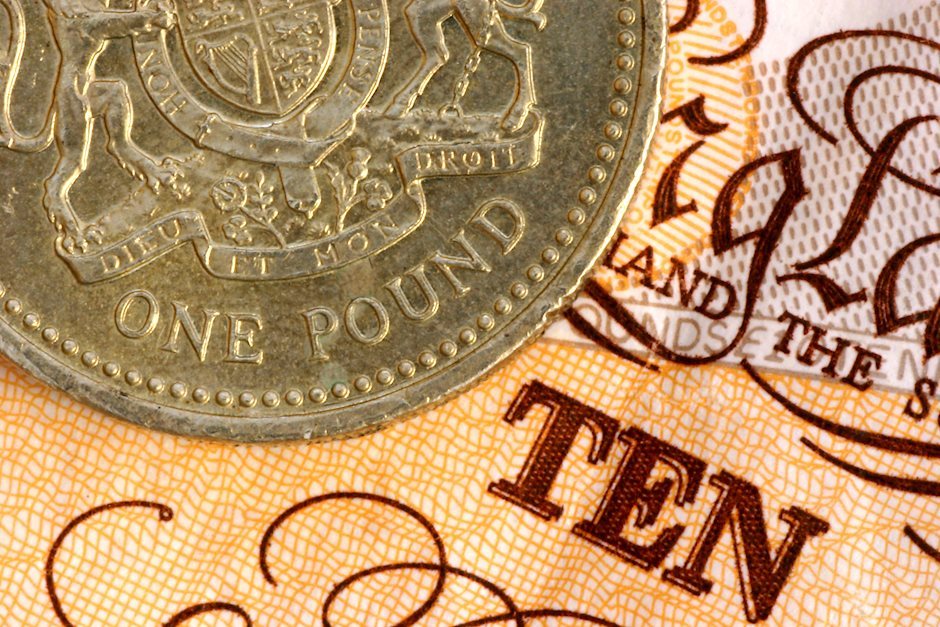Pound Sterling falls further as weak UK Retail Sales soften inflation outlook
- Pound Sterling drops sharply as the UK Retail Sales contracted significantly in December.
- A deepening cost-of-living crisis forced households to cut spending despite the festive season.
- The BoE may continue to reiterate the need for higher interest rates for longer.

The Pound Sterling (GBP) falls sharply as the United Kingdom Office of National Statistics (ONS) reports downbeat Retail Sales data for December. UK household spending contracted significantly as individuals faced the heavy burden of higher interest rates and consumer price inflation, which deepened the cost-of-living crisis. A sharp decline in high street sales would have been expected to ease pressure on the stubbornly high inflation outlook but in the end it was insufficient to move the needle.
A significant contraction in the Retail Sales could have increased the odds of an early rate cut by the Bank of England (BoE). In spite of a significant fall in the UK consumer spending, however, BoE policymakers are expected to maintain a restrictive monetary policy stance until they are convinced that the underlying inflation will return to a 2% target in a timely and sustainable manner.
Going forward, market participants will shift their focus towards preliminary S&P Global PMI data for January, which will be released next week. The UK Manufacturing PMI has been contracting for more than a year and is expected to continue on the backfoot.
Daily Digest Market Movers: Pound Sterling drops further as US Dollar recovers
- Pound Sterling faces an intense sell-off as the ONS reports a sharp decline in the Retail Sales data for December.
- Retail Sales excluding fuel prices was down sharply by 3.3% against expectations of a 0.6% fall. The economic data rose by 1.5% in November. On an annual basis, consumer spending (ex fuel) surprisingly contracted 2.1% versus. consensus of a 1.3% increase.
- Monthly sales at retail stores contracted sharply by 3.2% after expanding 1.4% in November. Investors anticipated a slower decline of 0.5%. Annually, consumer spending shrank surprisingly by 2.4% while investors projected a growth of 1.1%. In November, the economic data was slightly increased by 0.2%.
- The downbeat Retail Sales data is expected to ease the sticky inflation outlook.
- This is expected to provide a temporary relief to Bank of England (BoE) policymakers, which got worried about upside risks to price pressures after the release of the stubbornly higher inflation data for December.
- However, the stress of deepening recession fears due to a vulnerable economic outlook will keep BoE policymakers on their toes.
- It would be a balancing act for BoE policymakers to decide whether to turn dovish to safeguard the economy from recession or to maintain a restrictive monetary policy for bringing inflation down towards 2%.
- Meanwhile, investment banking firm Goldman Sachs is anticipating that the BoE will start reducing interest rates from August this year. The brokerage house now expects that interest rates will be reduced by 75 basis-points (bps) by the end of 2024.
- The market mood is quiet amid an absence of US front-line economic indicators. Meanwhile, market participants will focus on the speech from San Francisco Mary Daly.
- Fed Daly is expected to deliver a hawkish guidance on interest rates until policymakers get convinced that inflation will return to 2% in a timely manner.
- On Thursday, Federal Reserve Bank of Atlanta President Raphael Bostic said that rate cuts should only be undertaken if the central bank gets evidence indicating that inflation will return to the 2% target on a sustainable basis.
- Bostic warned that premature rate cuts could boost price pressures and impair efforts made to date to curtail higher inflation.
Technical Analysis: Pound Sterling falls from 1.2700
Pound Sterling drops sharply after facing selling pressure near the round-level resistance of 1.2700. The near-term appeal for the GBP/USD pair is not bullish anymore as it is failing to climb above the 20-day Exponential Moving Average (EMA), which trades around 1.2690. While the 50-day EMA continues to provide support to the Pound Sterling bulls.
The 14-period Relative Strength Index (RSI) trades inside the 40.00-60.00 range, indicating a consolidation ahead amid absence of a potential economic trigger.
Pound Sterling FAQs
What is the Pound Sterling?
The Pound Sterling (GBP) is the oldest currency in the world (886 AD) and the official currency of the United Kingdom. It is the fourth most traded unit for foreign exchange (FX) in the world, accounting for 12% of all transactions, averaging $630 billion a day, according to 2022 data.
Its key trading pairs are GBP/USD, aka ‘Cable’, which accounts for 11% of FX, GBP/JPY, or the ‘Dragon’ as it is known by traders (3%), and EUR/GBP (2%). The Pound Sterling is issued by the Bank of England (BoE).
How do the decisions of the Bank of England impact on the Pound Sterling?
The single most important factor influencing the value of the Pound Sterling is monetary policy decided by the Bank of England. The BoE bases its decisions on whether it has achieved its primary goal of “price stability” – a steady inflation rate of around 2%. Its primary tool for achieving this is the adjustment of interest rates.
When inflation is too high, the BoE will try to rein it in by raising interest rates, making it more expensive for people and businesses to access credit. This is generally positive for GBP, as higher interest rates make the UK a more attractive place for global investors to park their money.
When inflation falls too low it is a sign economic growth is slowing. In this scenario, the BoE will consider lowering interest rates to cheapen credit so businesses will borrow more to invest in growth-generating projects.
How does economic data influence the value of the Pound?
Data releases gauge the health of the economy and can impact the value of the Pound Sterling. Indicators such as GDP, Manufacturing and Services PMIs, and employment can all influence the direction of the GBP.
A strong economy is good for Sterling. Not only does it attract more foreign investment but it may encourage the BoE to put up interest rates, which will directly strengthen GBP. Otherwise, if economic data is weak, the Pound Sterling is likely to fall.
How does the Trade Balance impact the Pound?
Another significant data release for the Pound Sterling is the Trade Balance. This indicator measures the difference between what a country earns from its exports and what it spends on imports over a given period.
If a country produces highly sought-after exports, its currency will benefit purely from the extra demand created from foreign buyers seeking to purchase these goods. Therefore, a positive net Trade Balance strengthens a currency and vice versa for a negative balance.
Author

Sagar Dua
FXStreet
Sagar Dua is associated with the financial markets from his college days. Along with pursuing post-graduation in Commerce in 2014, he started his markets training with chart analysis.

















